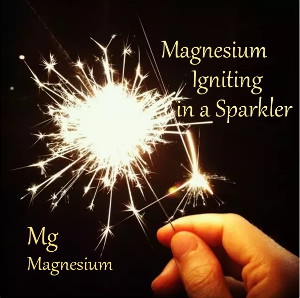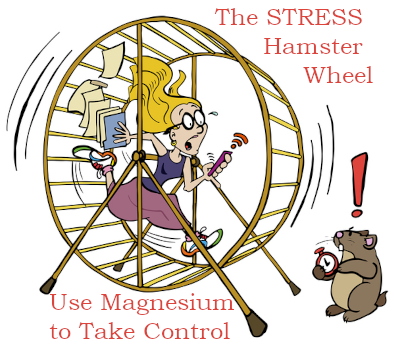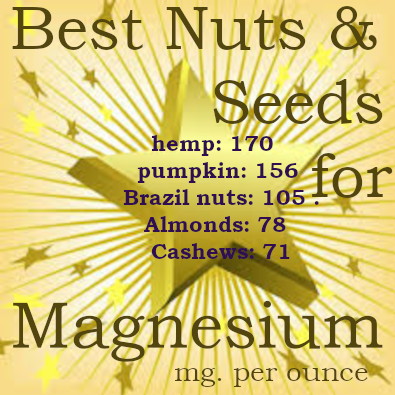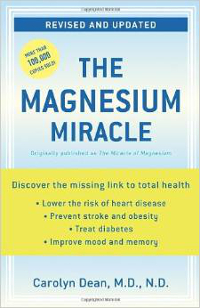
“Magnesium is the spark of life, constantly igniting metabolic reactions throughout the body,” Dr. Dean.
Yet nearly half of Americans’ magnesium intake falls below the most minimal daily recommendation of 310 mg for women and 400 mg for men.
Enter a bleak complication: stress elevates cortisol, the body’s hard working stress hormone that mobilizes glucose to fuel muscles and provide energy to respond to stressors (fight or flight) which involves masses of metabolic reactions, all ignited by magnesium.
Obviously cortisol is a good thing… right up until the stress is ongoing and our magnesium levels can’t keep up with cortisol’s demands for action. Plus, long periods of high level stress, with resultant high cortisol levels, transform the body’s need for fight or flight glucose to a craving for fatty, sugary foods in the hope of creating powerful reserves to combat stress-causing threats. The bleak part is that storage takes place as belly fat.

The STRESS Hamster Wheel ~
Magnesium Helps you Take Control
Once stress sets the magnesium “hamster wheel” spinning there’s a blur of magnesium depletion from higher cortisol levels, quickly followed by an increased sense of stress in the absence of adequate, calming magnesium.
Conversely, and vastly important, the higher your magnesium level is, the lower your cortisol level will be. This was illustrated by a study that found rugby players who supplemented with magnesium had lower cortisol levels during the stressful time before a big game than the players who didn’t.
Personally I had no awareness of magnesium till my friend Tina said a doctor she followed on social media had said magnesium reduces the effects of Parkinson’s Disease, which she had. That seemed so monumental I decided to research magnesium, order some, and try it.
What convinced me
At the time I was having B12 shots. I noticed that if I gave myself a doctor prescribed B12 shot in the evening, I would invariably get intense cramps in my legs and feet during the night. If I forgot the shot during the day, having it at night predicted so much pain I’d wait for the next day.
But, I when I took a magnesium tablet in the evening I could have an evening B12 shot with no cramps during the night. In fact, once I began using magnesium I totally stopped having muscle cramps in my feet and legs during the night.
 Shared symptoms
Shared symptoms
Low magnesium and low vitamin B12 levels have many identical symptoms: for instance tingling, numbness, pins and needles, sensitivity to noise. This is because neither magnesium nor vitamin B12 can be released from food without adequate stomach acid.
If you use antacids you may not be able to access the magnesium and vitamin B12 in foods. Luckily, both nutrients are readily available as supplements.
If you eat a lot of calcium foods, especially dairy, then it’s good to take a magnesium supplement along with those foods to prevent calcium buildups like bone spurs, or even some headaches.
If you have symptoms of low magnesium you can easily buy magnesium tablets, use them, and discover exactly how much difference they make. For me it was remarkable not only because I had no more cramps waking me at night, but because it actually helped me sleep.

Symptoms of low magnesium
- anxiety
- depression
- excessive emotion
- fatigue
- headaches
- insomnia
- light-headedness
- dizziness
- sensation of a lump in your throat
- pins and needles in the extremities
- cramps
- muscle pain
- anorexia
- confusion
- poor memory
- apprehension
- shortness of breath
- palpitations
- nervousness
Calcium can block magnesium
Calcium and magnesium compete for absorption. In fact, too much calcium in your diet and it will block magnesium absorption. Believe it or not, consuming a lot of dairy can cause a magnesium deficiency. If you eat a lot of dairy, add magnesium to your diet.
Sunshine helps you absorb magnesium ~
 Your body needs Vitamin D in order to use magnesium. A significant source of vitamin D is direct sunshine on your skin (there’s no effect through glass). A short exposure to sunshine makes a big difference ~10 minutes a day on your face and hands has an effect. One hour of whole body sunshine can produce 10,000 iu! Using 2,000 to 10,000 iu of vitamin D supplements daily has no side effects and no toxicity. So, when there’s little sunshine it’s a good idea to take vitamin D supplements.
Your body needs Vitamin D in order to use magnesium. A significant source of vitamin D is direct sunshine on your skin (there’s no effect through glass). A short exposure to sunshine makes a big difference ~10 minutes a day on your face and hands has an effect. One hour of whole body sunshine can produce 10,000 iu! Using 2,000 to 10,000 iu of vitamin D supplements daily has no side effects and no toxicity. So, when there’s little sunshine it’s a good idea to take vitamin D supplements.
Magnesium supplements ~ Cost effective!
If you are taking a calcium supplement, take a magnesium supplement with it to avoid bone spurs and headaches. You can’t get the benefits of calcium without magnesium. (When I was a Realtor I subscribed to a newsletter written by women pharmacists who dealt over and over again with the need for magnesium to avoid osteoporosis. I followed their advice and was rewarded ~ when I had a bone density test, I was told mine was excellent. I was going on 60 at the time.)
How much magnesium?
The recommended daily allowance for magnesium is 400 mgs for men, 310 mgs for women. Magnesium is extremely safe by mouth ~ too much simply causes diarrhea. Try increasing the amount of magnesium you take by mouth until it causes diarrhea, then reduce the dose slightly so it does not. This is called taking magnesium to bowel tolerance (just like using vitamin C to bowel tolerance).

To absorb magnesium you need gastric acid
If you have hypochlorhydria, which is low stomach acid, you will have poor magnesium absorption. Read more.
Magnesium reduces headaches ~ even migraines

There is research showing that magnesium can reduce headaches, even if you have a migraine that is in process. “The importance of magnesium in the pathogenesis of migraine headaches is clearly established by a large number of clinical and experimental studies.” B.T. Altura

Foods containing Magnesium ~
Many herbs and spices are rich in magnesium, like dried coriander leaf, chives, spearmint, dill, sage, basil, fennel, savory, parsley, cumin, tarragon, oregano, saffron, cloves, caraway, curry, thyme and black pepper.
Fresh vegetables are a good source of magnesium. Magnesium is lost when foods are processed. Sadly, magnesium usually isn’t replaced as “enrichment” at the processing plant.
List of foods containing magnesium ~Click here.
Random magnesium facts
I have The Giant Book of Women’s Health Secrets which says the British tried to duplicate the American study which had shown aspirin could stop a heart attack. They were unable to duplicate the results. The reason given by the authors is that in England aspirin is not “buffered” like it is here. The buffering agent is magnesium. The authors suggest that because magnesium relaxes muscles, it most likely is the magnesium in U.S. aspirin which stops the heart attack. They suggest taking magnesium for headaches. I had to try that, of course. And sure enough, it works.

The Magnesium Miracle

Carolyn Dean, M.D., N.D., author of The Magnesium Miracle, is a medical doctor, naturopath, acupuncturist, homeopath, herbalist, certified clinical nutritionist, and a regular guest on radio and television programs. She has written three other health books, in addition to her top selling The Magnesium Miracle, and is a contributing editor to Natural Health magazine.
Magnesium, Dr. Dean emphasizes,
- protects the brain from toxins such as food additives.
- naturally thins blood, preventing clots, strokes, and pain.
- relaxes head and neck muscle tension.
- People with Alzheimer’s and Parkinson’s are often low in Magnesium.
More than seventy-five years ago, medical scientists declared magnesium to be an essential nutrient, indispensable to life. When this mineral is part of your diet, you are guarding against and helping to alleviate health threats such as heart disease, stroke, osteoporosis, diabetes, depression, arthritis, and asthma.
But while research continues to reaffirm magnesium’s irreplaceable contribution to good health, many Americans remain dangerously deficient.
In The Magnesium Miracle, Dr. Carolyn Dean, an authority on this mineral who has used it with dramatic success in her own practice, explains the vital role that magnesium plays in the control of many serious ailments, from painful muscle spasms and bladder problems to traumatic brain injury and complications of pregnancy and childbirth.
Dr. Dean discusses how diets and lifestyles can create a dangerous magnesium deficiency and she talks about the symptoms, many listed above, of low magnesium levels. She also addresses how prescription medicines, such as birth control pills, can deplete magnesium.
I love this, by Dr. Carolyn Dean about magnesium. It’s so expressive of how powerful magnesium is.
My first encounter with magnesium was in high school chemistry. Each student was given a thin strip of magnesium and told to light one end carefully. The previous week we had learned that magnesium is the eighth most abundant element, constituting approximately 2 percent of the earth’s crust and 1.14 percent of seawater. By comparison, calcium makes up 3 percent of the earth’s crust but only 0.05 percent of seawater. There are 4-6 tsp (20-28 g or 2 oz) of magnesium in the body, comprising about 0.05 percent of the body’s weight. This information in no way prepared us for the dynamic effect of lighting the magnesium strip. It flared up like an electric sparkler and disappeared in a flash. This effervescent property serves as an important reminder of magnesium’s versatility as the spark of life, constantly igniting metabolic reactions throughout the body.
